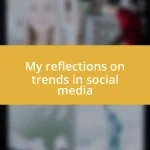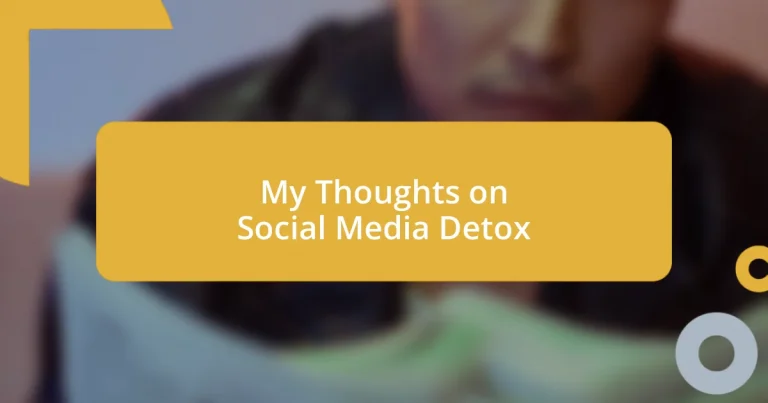Key takeaways:
- Social media can negatively impact self-esteem, mental health, and overall well-being through constant comparison and exposure to negativity.
- A social media detox can lead to improved mental health, better sleep, increased productivity, and enhanced real-life connections.
- After a detox, it’s crucial to reflect on the experience and implement a structured approach to social media use, prioritizing offline relationships.
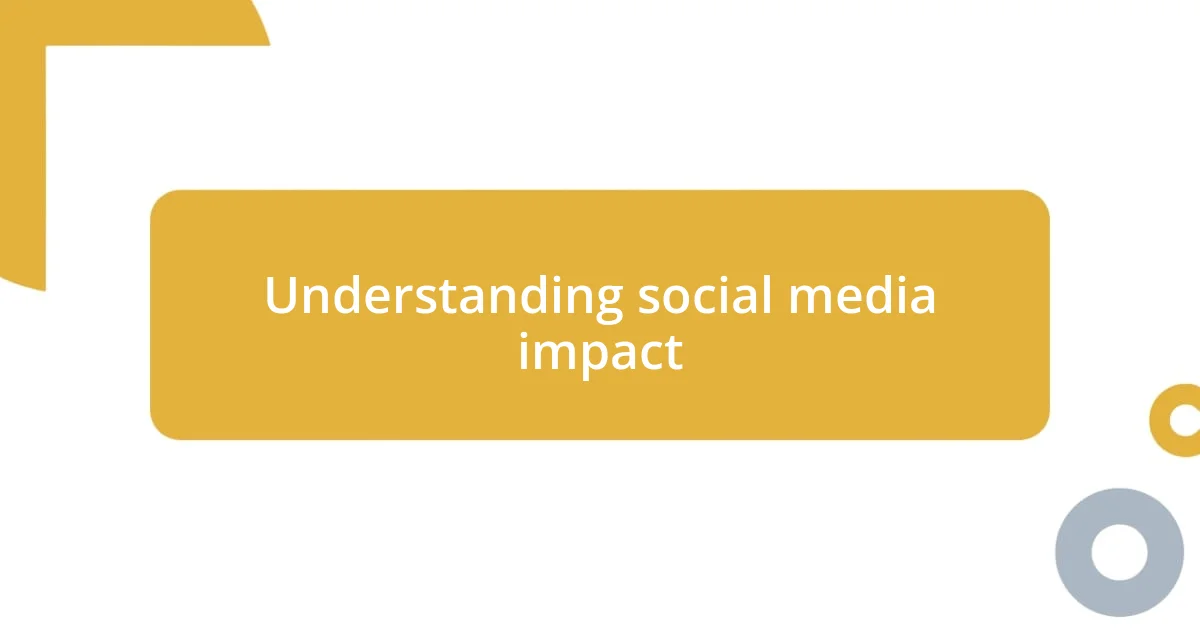
Understanding social media impact
Social media can be a double-edged sword. While I often find great joy connecting with friends and catching up on trends, I can’t help but wonder: is this constant connectivity truly beneficial? There are days when I scroll for hours, only to feel a wave of fatigue and disconnection wash over me.
It’s interesting to reflect on how social media shapes our self-image. For instance, I’ve caught myself comparing my reality to the highlight reels of others. This comparison game can undermine our self-esteem, leaving us questioning our worth. Have you ever felt that way after a deep scroll through your feed?
Finally, let’s consider the impact on our mental health. There have been moments when I logged off feeling overwhelmed by negativity and tension. It really makes me think about the importance of moderation. How often do we take a step back and assess how social media affects our mood and overall perspective on life?
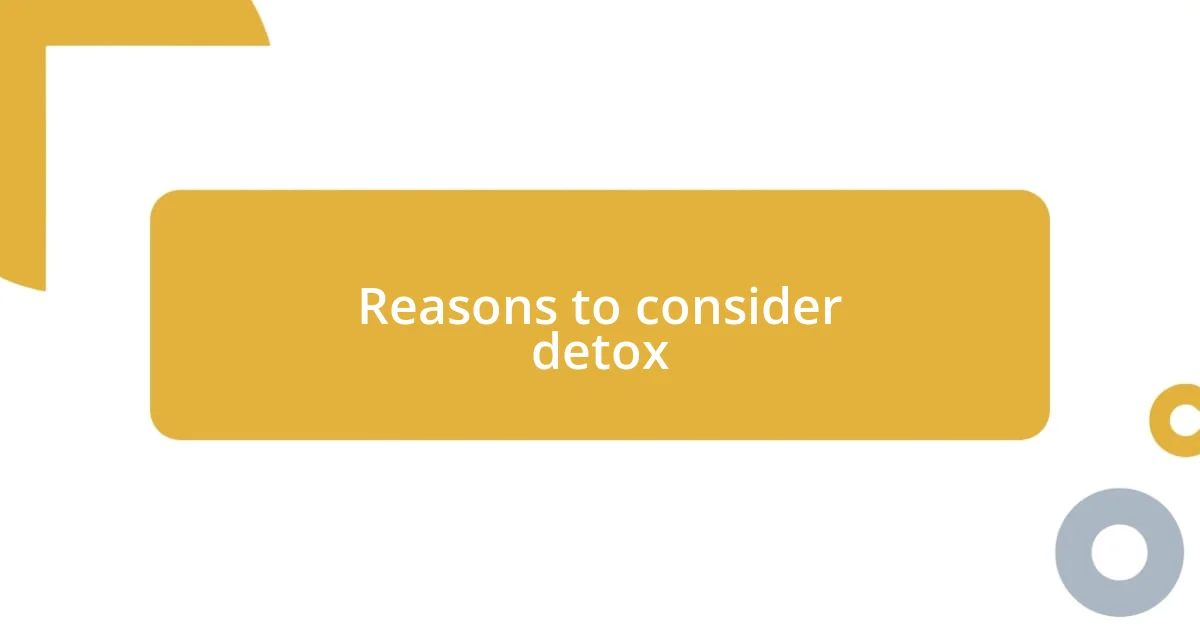
Reasons to consider detox
Taking a break from social media can provide a much-needed mental clarity. I recall a week when I decided to unplug completely. Initially, I felt anxious about missing out, but as the days went by, I started to notice my thoughts becoming clearer and my focus sharpening. Suddenly, I had more time to engage with my hobbies, like reading and painting, which fostered a deeper sense of fulfillment than any online interaction ever could.
Here are some reasons to consider a social media detox:
- Improved Mental Health: Distance from online negativity can lead to enhanced mood and decreased anxiety.
- Better Sleep Patterns: Reducing screen time, especially before bed, often results in deeper and more restorative sleep.
- Increased Productivity: With fewer distractions, I found myself completing projects I had been putting off for ages.
- Rekindled Real-Life Connections: Time spent away from the screens allows for more meaningful connections with friends and family.
- Enhanced Self-Esteem: A break can help mitigate the harmful comparisons we often make, validating our worth outside of likes and shares.
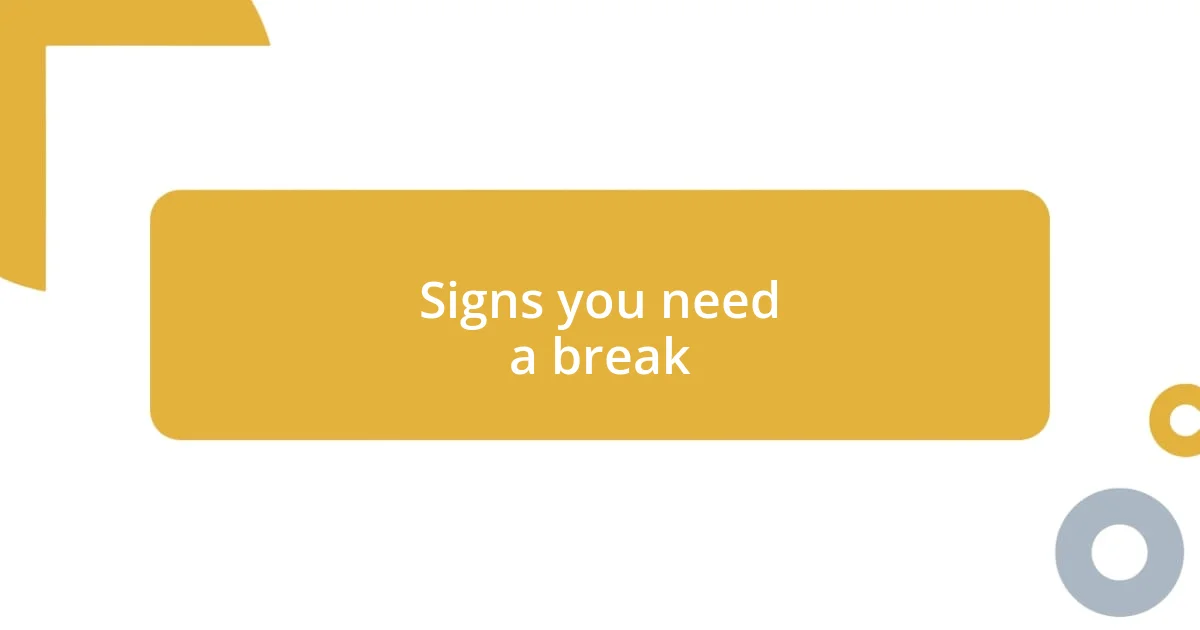
Signs you need a break
It’s incredible how quickly our social media habits can transform into signs we need a break. I remember a period when I felt an overwhelming urge to check notifications every few minutes, even during meals or conversations. That constant anxiety over what I might be missing out on made me realize just how tightly social media had wrapped its grip around my daily life. Recognizing that feeling is often the first step toward understanding when it’s time for a detox.
Another clear indication that a break is needed can be found in emotions. For me, scrolling started triggering feelings of sadness and inadequacy. I’ve experienced moments where I’d close my phone and feel a weight in my chest, as if the curated lives of others were pressing down on me. If you find social media more draining than uplifting, that might just be your cue to log off for a while.
Sometimes, even our physical health can suffer from excessive social media use. I had noticed headaches creeping in and sleep becoming elusive, all too often linked to late-night scrolling sessions. If you’re feeling restless, fatigued, or experiencing headaches, these could be direct signals that social media is taking more from you than it’s giving. Trust me, that break can be refreshing.
| Signs You Need a Break | Personal Experience |
|---|---|
| Constant Urge to Check | I felt an overwhelming need to check my phone every few minutes, even during meaningful moments. |
| Negative Emotions | Scrolling left me feeling inadequate and heavy-hearted, making me realize it was draining my positivity. |
| Physical Symptoms | Headaches and restlessness became my new normal, often coinciding with late-night browsing. |
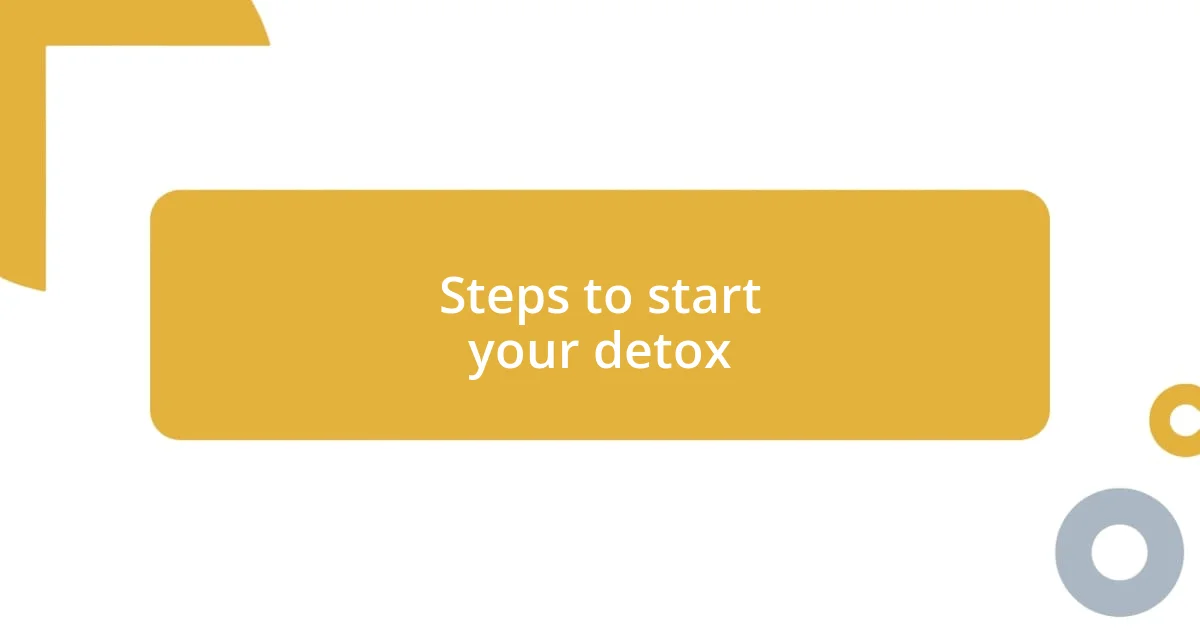
Steps to start your detox
To kick off your social media detox, I recommend setting clear boundaries. I started by choosing specific times when I would check my accounts each day. This strategy not only helped me regain control over my screen time, but it also allowed me to be more present during the moments that mattered—like dinner with family or enjoying a walk in the park. Have you ever noticed how easy it is to lose track of time online? By limiting my access, I felt less pressured to constantly scroll.
Another effective step is to declutter your social media feeds. I found it surprisingly liberating to unfollow accounts that didn’t resonate with me anymore. You know those pages that just add to your stress or make you feel inadequate? Removing those from my feed cleared up mental space for more positive content. Imagine how refreshing it is to wake up and see posts that inspire rather than drain you!
Lastly, don’t forget to replace the time you usually spend online with something you love. When I first withdrew from social media, I picked up a hobby I hadn’t touched in years—gardening! The act of nurturing plants not only brought me joy, but it also redirected my focus from online validation to real-world accomplishments. What activities could you explore? Whether it’s painting, hiking, or even meditating, finding that alternative passion can transform your detox journey into something fulfilling.
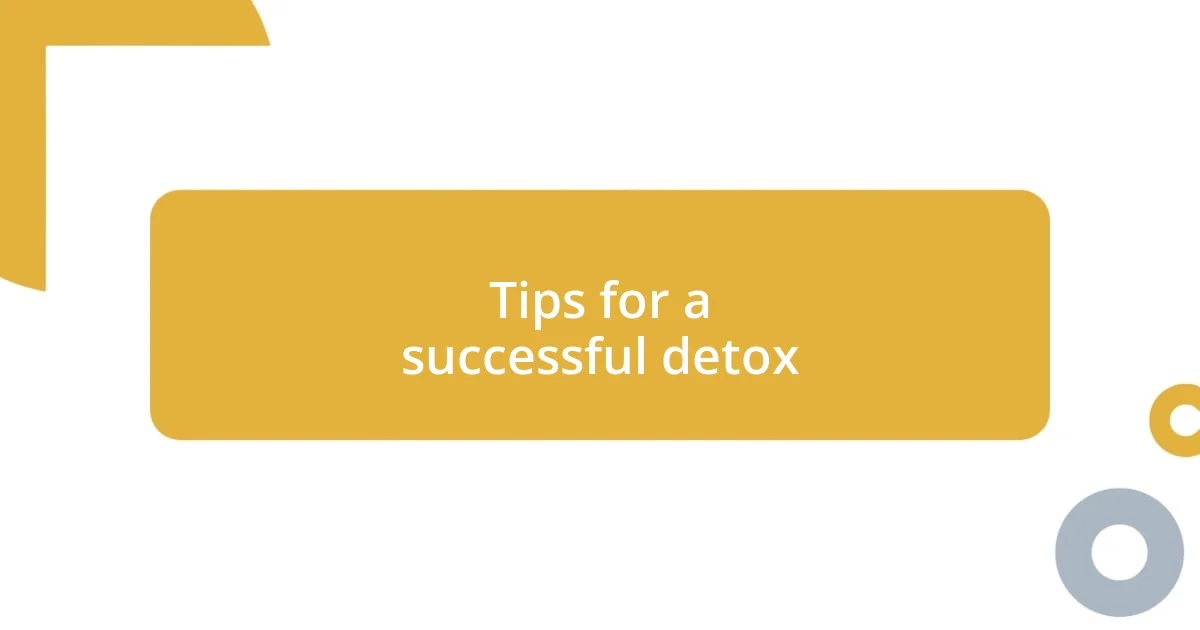
Tips for a successful detox
One of the most effective tips for a successful detox is to establish smartphone-free zones. I remember creating a rule for myself that banned phone usage in the bedroom. It surprised me how much my sleep improved! Imagine waking up refreshed instead of groggy after another late-night scroll. Setting boundaries like this helps cultivate a more peaceful environment and fosters deeper connections in your offline life.
Another crucial step is to engage in mindful practices. I found that journaling about my feelings during my detox was incredibly enlightening. It allowed me to reflect on the emotions that popped up when I stepped away from my screens. Have you ever considered how those feelings can guide you toward healthier habits? Writing down my thoughts not only provided clarity but also reinforced my commitment to the detox.
Finally, community support can be a game-changer. I leaned on friends and family who shared in my journey, and their encouragement was invaluable. Whether it’s joining a support group or simply telling loved ones about your goals, having that network provides accountability. Can you think of someone who would join you in your detox journey? Having a buddy can make the experience not only more enjoyable but also more effective, as you both navigate your social media habits together.
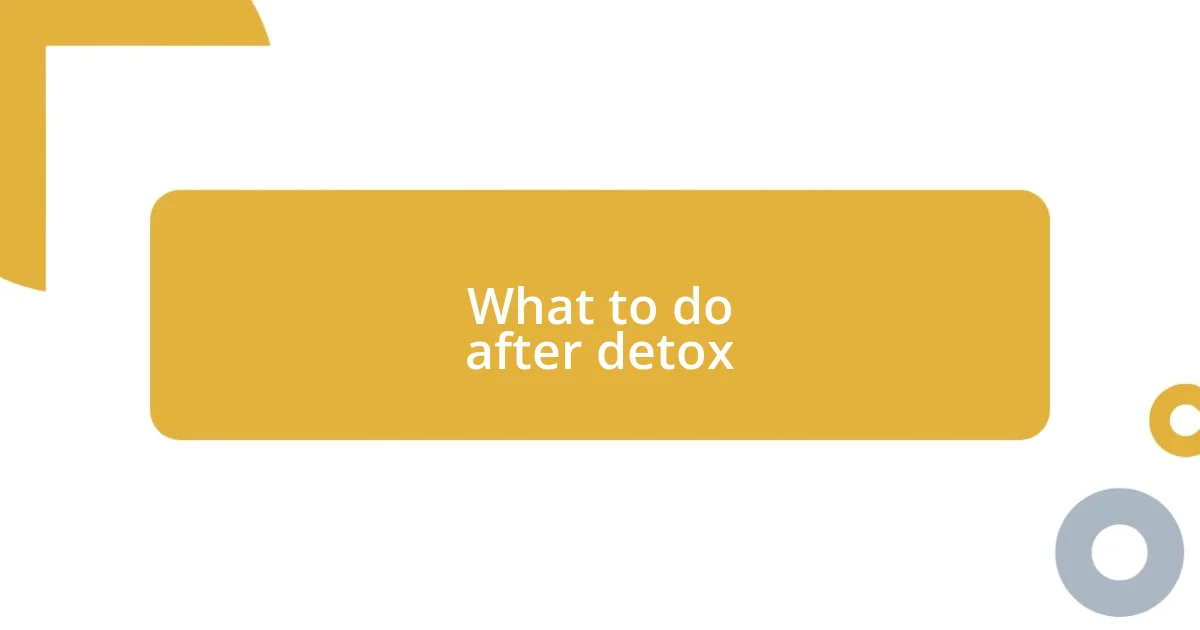
What to do after detox
After completing your social media detox, it’s important to reflect on your experience. I took a moment to sit down with a cup of tea and really think about what I learned. It was fascinating to realize how much clearer my mind felt without the constant barrage of notifications and comparisons. Have you ever noticed how our brains can feel overstuffed after scrolling for hours? This time for introspection allows you to assess your relationship with social media and determine what to keep or change moving forward.
Next, I found it incredibly beneficial to implement a schedule for my social media use. Instead of jumping on whenever I felt like it, I created designated times during the day when I’d catch up on posts or engage with friends. It not only helped me maintain the newfound clarity but also turned a once mindless activity into something I consciously enjoyed. What if you could reclaim those precious moments that would otherwise slip away unnoticed? Trust me, those scheduled times can become something to look forward to rather than a compulsive habit.
Lastly, consider nurturing offline relationships that may have been overshadowed by your digital life. I felt a renewed sense of connection when I re-engaged with friends and family without the filter of social media. We often forget how meaningful face-to-face conversations can be. Think back to that time you laughed with a friend over coffee—wasn’t that more fulfilling than reacting to a post online? As you step back into the social media landscape, prioritize those real-life interactions. They can enrich your life in ways that scrolling never will.
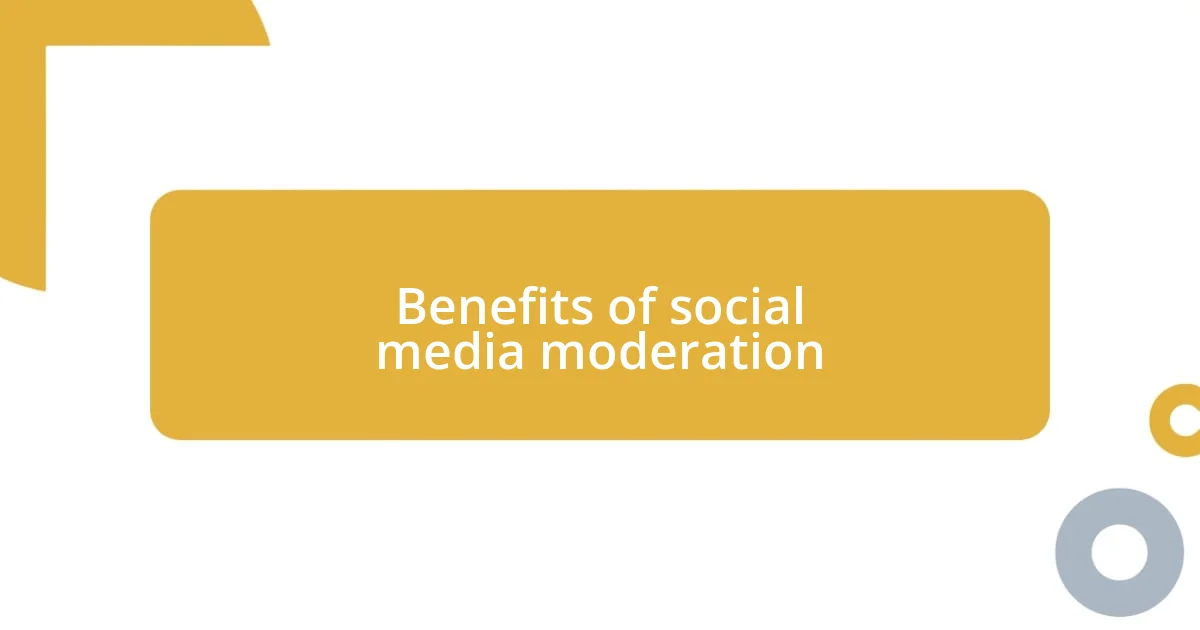
Benefits of social media moderation
Moderating social media can significantly boost your mental clarity. Personally, I found that limiting my online interactions allowed me to think more deeply about my own ideas and feelings without external distractions. Have you ever felt that pressure to conform to trends online? By stepping back, it becomes easier to discover your authentic self, free from the noise.
Another benefit of social media moderation is better emotional well-being. I remember days when I’d feel anxious simply scrolling through my feed, comparing my life with others. Once I took a break, I realized how much more at peace I felt—almost like a weight had been lifted. Isn’t it interesting how our emotions can fluctuate based on what we consume? When I embraced moderation, I began to control my emotional landscape rather than letting it be influenced by curated online personas.
Lastly, social media moderation fosters healthier relationships. After reducing my online presence, I noticed how much more I appreciated the time spent with close friends and family. It’s funny how we can be physically present with people but mentally miles away. Have you experienced that awkward moment when you’re in a room full of people, yet everyone is glued to their screens? By prioritizing real-life interactions, I rekindled connections and shared experiences that truly enriched my life. There’s something irreplaceable about genuine laughter and conversation that screens simply can’t replicate.






